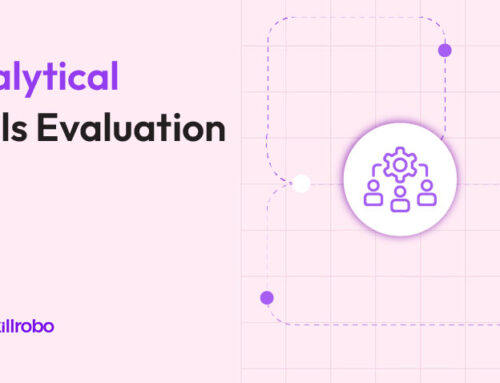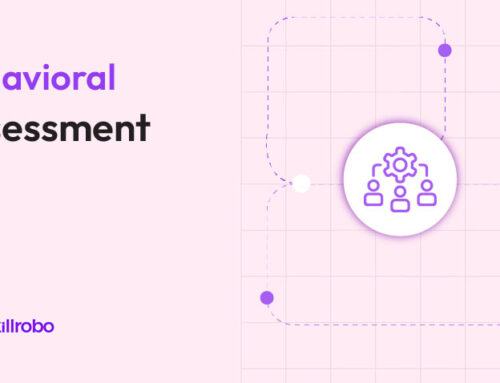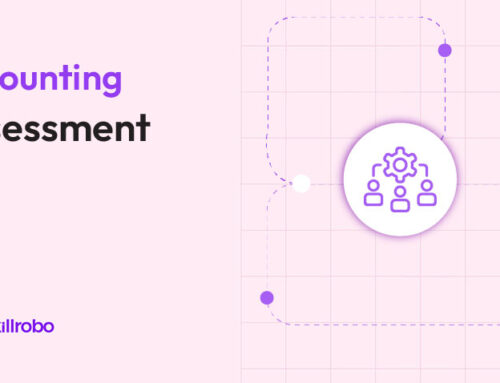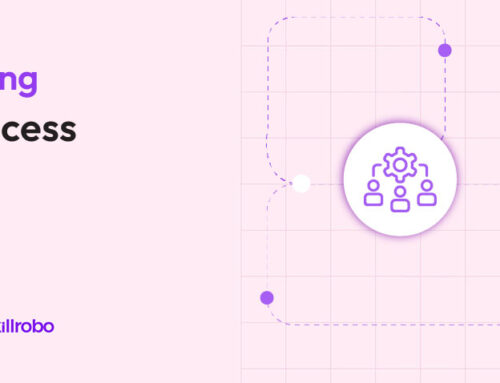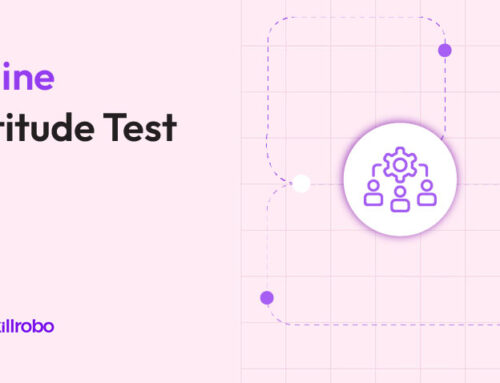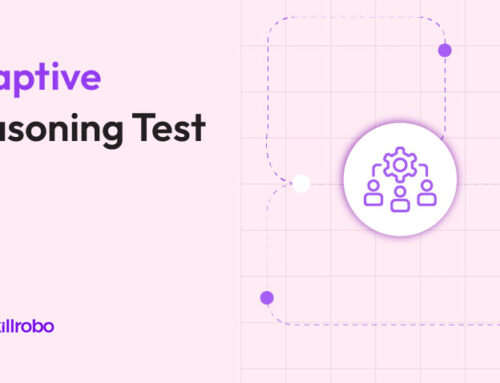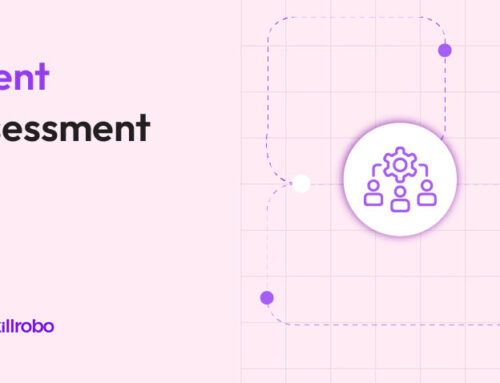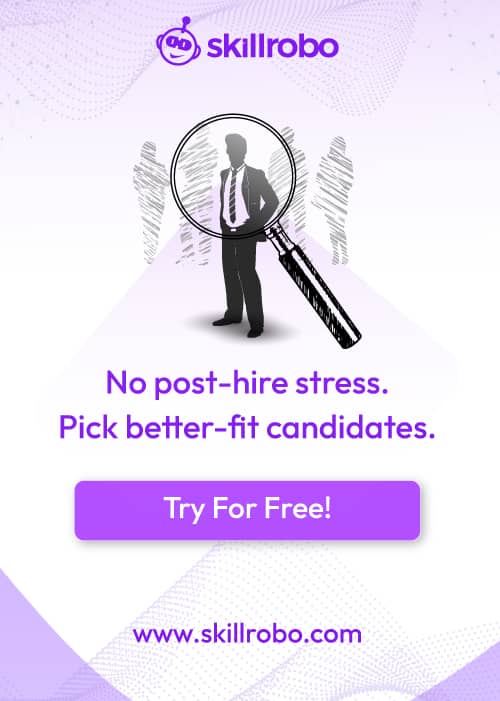Table of Contents
- What is Measured in Aptitude Tests?
- Why Recruiters Use Aptitude Tests
- 20 Sample Questions Asked in an Aptitude Test
- Structuring Aptitude Tests for Smarter Hiring Decisions
- How Aptitude Test Software Improves Hiring
- Industry Use Cases for Aptitude Testing
- How Skillrobo Supports Smarter Aptitude Testing
- Smarter Screening with Aptitude Test Questions and Answers
- Frequently Asked Questions
Related articles

What is Measured in Aptitude Tests?
Aptitude test questions and answers evaluate natural problem-solving capabilities rather than simply testing knowledge acquired through education or experience. They focus on measuring how well a candidate can process information, adapt to new challenges, and apply reasoning in unfamiliar situations — qualities that directly influence job performance and learning potential. These assessments are essential for recruiters seeking to predict long-term success rather than short-term technical expertise.
- Numerical Reasoning: Data analysis, percentages, ratios, and financial calculations.
- Verbal Reasoning: Language comprehension, grammar, vocabulary, and logical interpretation of text.
- Logical Reasoning: Pattern recognition, abstract sequences, and deduction-based puzzles.
- Spatial Reasoning: Visualization of objects, rotations, and 3D mapping.
- Situational Judgment: Scenario-based workplace decision-making.
By including diverse question formats, recruiters ensure hiring teams capture well-rounded cognitive profiles that extend beyond academic qualifications. This comprehensive approach strengthens both pre-employment assessment tests and role-specific evaluations, improving hiring accuracy, workforce alignment, and overall organizational fit.
Why Recruiters Use Aptitude Tests
For recruiters and HR teams, aptitude tests serve several critical functions that improve both immediate hiring decisions and long-term workforce planning. By providing objective, measurable insights into a candidate’s problem-solving and learning ability, these assessments strengthen every stage of the talent lifecycle.
1. Objective Screening
Standardized scoring ensures every applicant is assessed fairly and consistently, eliminating the variability of subjective evaluations and ensuring that all candidates compete on an equal footing.
2. Early Shortlisting
High-scoring candidates can be automatically advanced to subsequent stages of the hiring process. This helps recruiters focus their attention on the most qualified individuals, accelerating time-to-hire and reducing manual screening efforts.
3. Bias Reduction
Structured testing minimizes unconscious bias by focusing purely on cognitive capability rather than factors like educational background, demographics, or resume formatting, which often introduce unintended bias into hiring.
4. Talent Mobility
Aptitude test results not only support external hiring but also provide valuable data for internal career progression and talent mobility. Scores inform cross-functional role alignment, allowing companies to move existing employees into new roles that match their cognitive strengths and growth potential.
5. Talent Development Assessment
Cognitive profiles generated from aptitude testing serve as a foundation for ongoing talent development assessment. These insights help identify skill gaps, inform personalized training plans, and prepare employees for leadership, succession, and reskilling initiatives.
By leveraging aptitude test software, recruiters can administer assessments at scale and integrate candidate results directly with employee evaluation software. This ensures hiring decisions are supported by a centralized, data-driven system that aligns recruitment, development, and workforce planning seamlessly.
20 Sample Questions Asked in an Aptitude Test
Recruiters often wonder what questions are on an aptitude test and how to structure them for predictive accuracy. Below are real-world examples of the most common questions asked in aptitude test formats, with 4 questions in each category:
1. Numerical Reasoning
Tests a candidate’s ability to work with numbers, analyze data sets, and perform calculations that reflect real-world business scenarios. Essential for roles involving finance, analytics, and operations.
1. A company earns $450,000 quarterly. What is the annual revenue?
Answer: $1,800,000
2. If 5 workers can complete a project in 12 days, how many days for 10 workers?
Answer: 6 days
3. A product originally priced at $240 is on sale at 25% off. What’s the sale price?
Answer: $180
4. What is the simple interest on $5,000 for 3 years at a 4% annual rate?
Answer: $600
2. Verbal Reasoning
Measures comprehension, grammar, vocabulary, and language-based logic. It evaluates how well candidates interpret written information and draw conclusions. Highly valuable for communication-heavy roles like customer service, sales, and content writing.
1. Choose the synonym for “Ambiguous”
Answer: Unclear
2. Choose the correctly spelled word:
Answer: Occurrence
3. Identify the antonym for “Reluctant”
Answer: Willing
4. Select the grammatically correct sentence:
Answer: She has completed the project ahead of schedule.
3. Logical Reasoning
Assesses pattern recognition, problem-solving, and abstract thinking. It tests how candidates identify relationships between data points and apply structured reasoning. Highly relevant for technical, managerial, data-driven, and strategic decision-making roles.
1. Which number completes the series: 3, 6, 11, 18, __?
Answer: 27
2. Find the odd one out: Triangle, Rectangle, Circle, Square
Answer: Circle
3. Which shape continues this sequence: ▲ ■ ▲ ■ __?
Answer: ▲
4. Which number replaces the question mark: 2, 4, 8, 16, __?
Answer: 32
4. Spatial Reasoning
Evaluates a candidate’s ability to visualize, manipulate, and interpret shapes or objects in space. Tests often involve 2D-to-3D transformations, rotations, or mirror-image problems. Ideal for engineering, manufacturing, architecture, design, and logistics-based positions. Highly relevant for technical, managerial, data-driven, and strategic decision-making roles.
1. Which shape results from rotating a 3D cube 90 degrees?
Answer: Cube (unchanged shape)
2. Which unfolded box diagram matches the folded cube?
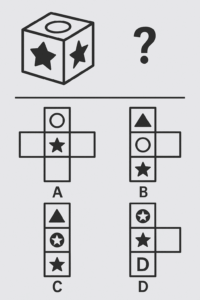
Answer: B
3. Which image is a mirror reflection of this shape?
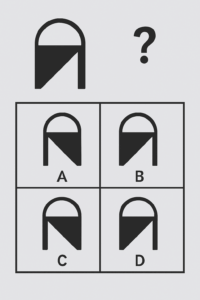
Answer: A
4. If a shape is folded along its dotted lines, which 3D object does it form?
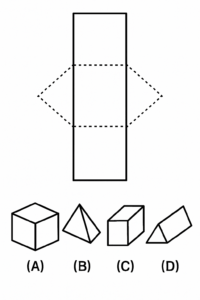 Answer: D
Answer: D
5. Situational Judgment
Presents realistic work scenarios to assess decision-making, interpersonal skills, and emotional intelligence. Candidates are evaluated on how they prioritize tasks, handle conflicts, and navigate workplace challenges. Widely used for customer service, supervisory, management, and leadership hiring across industries.
1. A customer is angry. What’s your first response?
Answer: Listen empathetically and resolve calmly.
2. Two teammates disagree on a deadline. What’s your action?
Answer: Facilitate compromise while ensuring project timelines stay on track.
3. You notice a colleague repeatedly missing deadlines. What do you do?
Answer: Offer support and clarify expectations, escalating only if needed.
4. You receive conflicting instructions from two managers. What’s your response?
Answer: Seek clarification directly to align priorities and avoid errors.
Including these aptitude test question examples allows recruiters to simulate real-world, job-relevant scenarios that assess cognitive and behavioral capabilities.
Structuring Aptitude Tests for Smarter Hiring Decisions
When recruiters combine these aptitude test question examples into structured assessments, they build scalable models for data-driven recruitment. Strong platforms allow customization by job role, seniority level, and functional domain—whether for tech, operations, sales, or finance.
Effective assessments balance cognitive difficulty with real-world relevance. This ensures the test predicts success, not just memorization. Recruiters should review aptitude tests and answer reports alongside interviews, work samples, and reference checks to form a well-rounded hiring decision.
How Aptitude Test Software Improves Hiring
Integrating aptitude test software into recruitment workflows delivers significant advantages for both recruiters and organizations, helping drive smarter, faster, and more consistent hiring outcomes.
1. Customization
Modern aptitude test platforms allow recruiters to create tailored assessments aligned with specific job roles, industries, and competency frameworks. This ensures that each candidate is evaluated based on the exact skills and cognitive abilities required for success in the role.
2. Candidate Experience
User-friendly, mobile-optimized interfaces enable candidates to complete assessments anytime and anywhere. A seamless testing experience minimizes anxiety, reduces dropout rates, and ensures a stronger talent pipeline for recruiters.
3. Real-Time Analytics
With immediate scoring, benchmarking, and candidate ranking, recruiters can access actionable insights as soon as candidates complete assessments. This accelerates shortlisting, enables more data-driven recruitment decisions, and eliminates manual evaluation delays.
4. Compliance
Leading aptitude test software platforms include built-in compliance features, ensuring secure data handling and adherence to GDPR, EEOC, and accessibility regulations. This protects both candidate privacy and the organization’s legal standing.
5. ATS Integration
Seamless integration with applicant tracking systems (ATS) and onboarding platforms allows recruiters to automate test administration, monitor progress, and consolidate candidate data in one centralized platform for easier management.
By embedding skills audit tools and skills assessment tools into these systems, recruiters not only improve hiring accuracy but also gain long-term workforce visibility. These tools help HR leaders track existing employee capabilities, identify skill gaps, support talent development assessment, and align recruitment with broader organizational growth strategies.
Industry Use Cases for Aptitude Testing
Aptitude tests are highly versatile tools that can be applied across industries to assess job-specific cognitive demands. By selecting the right test categories—whether numerical, logical, verbal, spatial, or situational—recruiters can evaluate candidates against real-world challenges unique to their roles. Below are examples of how different industries leverage aptitude testing to strengthen hiring decisions.
Financial Services – Numerical reasoning tests help identify quantitative analysts who can process data under time pressure.
Technology Companies – Logical reasoning and abstract problem-solving evaluate a developer’s thinking and code debugging aptitude.
Customer Support – Situational judgment tests screen for empathy, multitasking, and client resolution skills.
Healthcare Management – Verbal reasoning tests evaluate policy comprehension, clinical documentation, and communication clarity.
Manufacturing & Operations – Spatial reasoning tests assess technicians and engineers for machine calibration and systems troubleshooting.
How Skillrobo Supports Smarter Aptitude Testing
Skillrobo is a comprehensive pre-employment assessment platform designed for recruiters who want precision, scalability, and flexibility in evaluating candidates. With its advanced aptitude test software, Skillrobo allows hiring teams to design role-specific assessments that combine numerical, verbal, logical, and situational reasoning, aligned with real job demands. Recruiters can create customized tests for each role, ensuring only the most relevant skills and competencies are measured.
Beyond hiring, Skillrobo integrates seamlessly with employee assessment software, enabling organizations to track skill development, support internal mobility, and build long-term talent pipelines. Its real-time analytics, secure remote proctoring, and ATS integrations help recruiters manage both high-volume hiring and strategic workforce planning—all from a single, data-driven platform.
Smarter Screening with Aptitude Test Questions and Answers
Incorporating aptitude test questions and answers into your hiring process empowers recruiters to evaluate candidates objectively and consistently. Adaptive platforms, customizable content, and real-time analytics allow HR leaders to build agile, scalable hiring pipelines that reduce bias, improve decision-making, and identify true job fit early.
Sign up for Skillrobo today and elevate your assessment process with smarter, data-backed aptitude testing.
Frequently Asked Questions
1. What questions are on an aptitude test?
Typical questions involve numerical reasoning, verbal logic, spatial recognition, abstract patterns, and situational judgment.
2. Are aptitude tests accurate predictors of job success?
Yes, when validated and job-relevant, aptitude tests strongly correlate with future job performance.
3. Can aptitude tests replace interviews?
No. Aptitude tests support hiring but should complement interviews, work samples, and reference checks.
4. How do recruiters use aptitude test results?
Results help shortlist candidates, guide interview questions, inform onboarding, and even support promotion decisions.
5. Do aptitude test software platforms support remote hiring?
Yes. Many offer remote proctoring, browser lockdown, and real-time analytics to ensure integrity and flexibility.

What is Measured in Aptitude Tests?
Aptitude test questions and answers evaluate natural problem-solving capabilities rather than simply testing knowledge acquired through education or experience. They focus on measuring how well a candidate can process information, adapt to new challenges, and apply reasoning in unfamiliar situations — qualities that directly influence job performance and learning potential. These assessments are essential for recruiters seeking to predict long-term success rather than short-term technical expertise.
- Numerical Reasoning: Data analysis, percentages, ratios, and financial calculations.
- Verbal Reasoning: Language comprehension, grammar, vocabulary, and logical interpretation of text.
- Logical Reasoning: Pattern recognition, abstract sequences, and deduction-based puzzles.
- Spatial Reasoning: Visualization of objects, rotations, and 3D mapping.
- Situational Judgment: Scenario-based workplace decision-making.
By including diverse question formats, recruiters ensure hiring teams capture well-rounded cognitive profiles that extend beyond academic qualifications. This comprehensive approach strengthens both pre-employment assessment tests and role-specific evaluations, improving hiring accuracy, workforce alignment, and overall organizational fit.
Why Recruiters Use Aptitude Tests
For recruiters and HR teams, aptitude tests serve several critical functions that improve both immediate hiring decisions and long-term workforce planning. By providing objective, measurable insights into a candidate’s problem-solving and learning ability, these assessments strengthen every stage of the talent lifecycle.
1. Objective Screening
Standardized scoring ensures every applicant is assessed fairly and consistently, eliminating the variability of subjective evaluations and ensuring that all candidates compete on an equal footing.
2. Early Shortlisting
High-scoring candidates can be automatically advanced to subsequent stages of the hiring process. This helps recruiters focus their attention on the most qualified individuals, accelerating time-to-hire and reducing manual screening efforts.
3. Bias Reduction
Structured testing minimizes unconscious bias by focusing purely on cognitive capability rather than factors like educational background, demographics, or resume formatting, which often introduce unintended bias into hiring.
4. Talent Mobility
Aptitude test results not only support external hiring but also provide valuable data for internal career progression and talent mobility. Scores inform cross-functional role alignment, allowing companies to move existing employees into new roles that match their cognitive strengths and growth potential.
5. Talent Development Assessment
Cognitive profiles generated from aptitude testing serve as a foundation for ongoing talent development assessment. These insights help identify skill gaps, inform personalized training plans, and prepare employees for leadership, succession, and reskilling initiatives.
By leveraging aptitude test software, recruiters can administer assessments at scale and integrate candidate results directly with employee evaluation software. This ensures hiring decisions are supported by a centralized, data-driven system that aligns recruitment, development, and workforce planning seamlessly.
20 Sample Questions Asked in an Aptitude Test
Recruiters often wonder what questions are on an aptitude test and how to structure them for predictive accuracy. Below are real-world examples of the most common questions asked in aptitude test formats, with 4 questions in each category:
1. Numerical Reasoning
Tests a candidate’s ability to work with numbers, analyze data sets, and perform calculations that reflect real-world business scenarios. Essential for roles involving finance, analytics, and operations.
1. A company earns $450,000 quarterly. What is the annual revenue?
Answer: $1,800,000
2. If 5 workers can complete a project in 12 days, how many days for 10 workers?
Answer: 6 days
3. A product originally priced at $240 is on sale at 25% off. What’s the sale price?
Answer: $180
4. What is the simple interest on $5,000 for 3 years at a 4% annual rate?
Answer: $600
2. Verbal Reasoning
Measures comprehension, grammar, vocabulary, and language-based logic. It evaluates how well candidates interpret written information and draw conclusions. Highly valuable for communication-heavy roles like customer service, sales, and content writing.
1. Choose the synonym for “Ambiguous”
Answer: Unclear
2. Choose the correctly spelled word:
Answer: Occurrence
3. Identify the antonym for “Reluctant”
Answer: Willing
4. Select the grammatically correct sentence:
Answer: She has completed the project ahead of schedule.
3. Logical Reasoning
Assesses pattern recognition, problem-solving, and abstract thinking. It tests how candidates identify relationships between data points and apply structured reasoning. Highly relevant for technical, managerial, data-driven, and strategic decision-making roles.
1. Which number completes the series: 3, 6, 11, 18, __?
Answer: 27
2. Find the odd one out: Triangle, Rectangle, Circle, Square
Answer: Circle
3. Which shape continues this sequence: ▲ ■ ▲ ■ __?
Answer: ▲
4. Which number replaces the question mark: 2, 4, 8, 16, __?
Answer: 32
4. Spatial Reasoning
Evaluates a candidate’s ability to visualize, manipulate, and interpret shapes or objects in space. Tests often involve 2D-to-3D transformations, rotations, or mirror-image problems. Ideal for engineering, manufacturing, architecture, design, and logistics-based positions. Highly relevant for technical, managerial, data-driven, and strategic decision-making roles.
1. Which shape results from rotating a 3D cube 90 degrees?
Answer: Cube (unchanged shape)
2. Which unfolded box diagram matches the folded cube?

Answer: B
3. Which image is a mirror reflection of this shape?

Answer: A
4. If a shape is folded along its dotted lines, which 3D object does it form?
 Answer: D
Answer: D
5. Situational Judgment
Presents realistic work scenarios to assess decision-making, interpersonal skills, and emotional intelligence. Candidates are evaluated on how they prioritize tasks, handle conflicts, and navigate workplace challenges. Widely used for customer service, supervisory, management, and leadership hiring across industries.
1. A customer is angry. What’s your first response?
Answer: Listen empathetically and resolve calmly.
2. Two teammates disagree on a deadline. What’s your action?
Answer: Facilitate compromise while ensuring project timelines stay on track.
3. You notice a colleague repeatedly missing deadlines. What do you do?
Answer: Offer support and clarify expectations, escalating only if needed.
4. You receive conflicting instructions from two managers. What’s your response?
Answer: Seek clarification directly to align priorities and avoid errors.
Including these aptitude test question examples allows recruiters to simulate real-world, job-relevant scenarios that assess cognitive and behavioral capabilities.
Structuring Aptitude Tests for Smarter Hiring Decisions
When recruiters combine these aptitude test question examples into structured assessments, they build scalable models for data-driven recruitment. Strong platforms allow customization by job role, seniority level, and functional domain—whether for tech, operations, sales, or finance.
Effective assessments balance cognitive difficulty with real-world relevance. This ensures the test predicts success, not just memorization. Recruiters should review aptitude tests and answer reports alongside interviews, work samples, and reference checks to form a well-rounded hiring decision.
How Aptitude Test Software Improves Hiring
Integrating aptitude test software into recruitment workflows delivers significant advantages for both recruiters and organizations, helping drive smarter, faster, and more consistent hiring outcomes.
1. Customization
Modern aptitude test platforms allow recruiters to create tailored assessments aligned with specific job roles, industries, and competency frameworks. This ensures that each candidate is evaluated based on the exact skills and cognitive abilities required for success in the role.
2. Candidate Experience
User-friendly, mobile-optimized interfaces enable candidates to complete assessments anytime and anywhere. A seamless testing experience minimizes anxiety, reduces dropout rates, and ensures a stronger talent pipeline for recruiters.
3. Real-Time Analytics
With immediate scoring, benchmarking, and candidate ranking, recruiters can access actionable insights as soon as candidates complete assessments. This accelerates shortlisting, enables more data-driven recruitment decisions, and eliminates manual evaluation delays.
4. Compliance
Leading aptitude test software platforms include built-in compliance features, ensuring secure data handling and adherence to GDPR, EEOC, and accessibility regulations. This protects both candidate privacy and the organization’s legal standing.
5. ATS Integration
Seamless integration with applicant tracking systems (ATS) and onboarding platforms allows recruiters to automate test administration, monitor progress, and consolidate candidate data in one centralized platform for easier management.
By embedding skills audit tools and skills assessment tools into these systems, recruiters not only improve hiring accuracy but also gain long-term workforce visibility. These tools help HR leaders track existing employee capabilities, identify skill gaps, support talent development assessment, and align recruitment with broader organizational growth strategies.
Industry Use Cases for Aptitude Testing
Aptitude tests are highly versatile tools that can be applied across industries to assess job-specific cognitive demands. By selecting the right test categories—whether numerical, logical, verbal, spatial, or situational—recruiters can evaluate candidates against real-world challenges unique to their roles. Below are examples of how different industries leverage aptitude testing to strengthen hiring decisions.
Financial Services – Numerical reasoning tests help identify quantitative analysts who can process data under time pressure.
Technology Companies – Logical reasoning and abstract problem-solving evaluate a developer’s thinking and code debugging aptitude.
Customer Support – Situational judgment tests screen for empathy, multitasking, and client resolution skills.
Healthcare Management – Verbal reasoning tests evaluate policy comprehension, clinical documentation, and communication clarity.
Manufacturing & Operations – Spatial reasoning tests assess technicians and engineers for machine calibration and systems troubleshooting.
How Skillrobo Supports Smarter Aptitude Testing
Skillrobo is a comprehensive pre-employment assessment platform designed for recruiters who want precision, scalability, and flexibility in evaluating candidates. With its advanced aptitude test software, Skillrobo allows hiring teams to design role-specific assessments that combine numerical, verbal, logical, and situational reasoning, aligned with real job demands. Recruiters can create customized tests for each role, ensuring only the most relevant skills and competencies are measured.
Beyond hiring, Skillrobo integrates seamlessly with employee assessment software, enabling organizations to track skill development, support internal mobility, and build long-term talent pipelines. Its real-time analytics, secure remote proctoring, and ATS integrations help recruiters manage both high-volume hiring and strategic workforce planning—all from a single, data-driven platform.
Smarter Screening with Aptitude Test Questions and Answers
Incorporating aptitude test questions and answers into your hiring process empowers recruiters to evaluate candidates objectively and consistently. Adaptive platforms, customizable content, and real-time analytics allow HR leaders to build agile, scalable hiring pipelines that reduce bias, improve decision-making, and identify true job fit early.
Sign up for Skillrobo today and elevate your assessment process with smarter, data-backed aptitude testing.
Frequently Asked Questions
1. What questions are on an aptitude test?
Typical questions involve numerical reasoning, verbal logic, spatial recognition, abstract patterns, and situational judgment.
2. Are aptitude tests accurate predictors of job success?
Yes, when validated and job-relevant, aptitude tests strongly correlate with future job performance.
3. Can aptitude tests replace interviews?
No. Aptitude tests support hiring but should complement interviews, work samples, and reference checks.
4. How do recruiters use aptitude test results?
Results help shortlist candidates, guide interview questions, inform onboarding, and even support promotion decisions.
5. Do aptitude test software platforms support remote hiring?
Yes. Many offer remote proctoring, browser lockdown, and real-time analytics to ensure integrity and flexibility.



